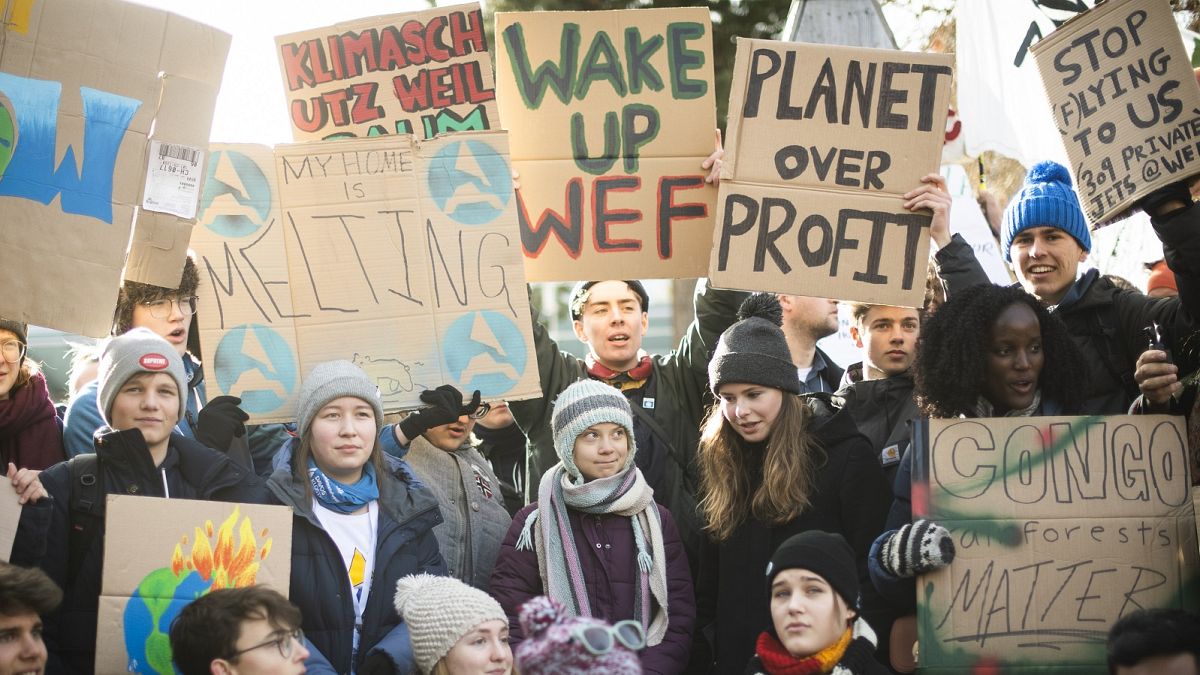Why are carbon emissions still rising? Why are climate negotiations failing to act? Blame the fossil fuel companies joining in discussions at Davos.
A new decade has started with scientists telling us the last one was the hottest in human history. But will it finally bring hope, a new era of action for this planetary emergency? Or will it be another lost decade - the last we can afford - which will condemn our generation to life on an unliveable planet?
For longer than we have been alive, the impact of burning fossil fuels on the climate has been known, yet fossil fuel companies have repeatedly denied it - and are still now funding doubt.
We are now at a point where countries and institutions across the world are declaring a climate emergency. Even this year’s World Economic Forum in Davos, which is coming to an end as executives fly home on private jets, has declared the climate and environmental emergency the top five risks to business.
Life on Earth is in crisis. Scientists agree we have entered a period of abrupt climate breakdown; we are in the midst of a mass extinction of our own making.
So why are carbon emissions still rising? Why are international climate negotiations failing to act? Blame those very same fossil fuel companies joining in discussions at Davos.
The five largest stock market-listed oil and gas companies have spent more than $1bn (€905 million) since the Paris Agreement - signed only half a decade ago - on lobbying and PR to delay, control or block policies to tackle climate change. ExxonMobil, the world’s biggest oil company, knew as early as 1981 about the impacts of climate change, while Shell, which is also amongst the largest oil companies in the world, knew as early as the 1950s. But rather than acting, they spent millions of dollars over decades to sew doubt. Today, they falsely pretend to hug us close.
The fact that they knew, they lied and they failed to take action on climate breakdown amounts to the biggest generational betrayal the world has ever seen. To our generation and to the future. And still, they keep on digging up more fossil fuels.
Our politicians and societies are still not acting like this is an emergency. We have marched in the streets in our millions. We addressed a room filled with world leaders at the UN climate talks. We have met with prime ministers, presidents and even the Pope. We have spent hundreds of hours participating in panels and speaking with journalists and filmmakers, including at Davos. We have been offered awards for our activism.
Yet, still the betrayal is perpetuated because rich and powerful oil, coal and gas companies are lobbying, advertising, and even sponsoring the UN climate talks. We were at COP25 in Madrid where lobbyists from Shell, BP and Chevron were speaking at events inside the conference centre, trying to convince the world to keep digging up fossil fuels. What’s more, Spain’s single most polluting company, coal and gas giant, Endesa was a sponsor alongside other dirty energy companies and fossil financing banks.
For our futures, we need to confront these deadly interests now. We need to cut fossil fuel lobbyists out of our politics and keep them away from politicians. They’ve set the house on fire and have no intention of putting it out.
Instead of listening, rich governments have spent more than two decades protecting the interests of the biggest polluters. They’ve prioritised the billions that the oil and gas industry make in profit every year over the billions of people already impacted. The failure of the COP25 was more proof if it was ever needed.
For us to have a realistic chance of staying below global temperature rises of 1.5c, we need to stop burning fossil fuels now. We need to stop financing fossil fuels and we need to cut the fossil fuel industry and its lobbyists out of our politics.
This can start by kicking polluters out of international talks, like Davos and those at the UN. Governments representing almost 70% of the world's population, those most vulnerable to droughts and floods, have already called for big polluters to not be allowed at the UN climate talks. In Europe, more than 200 organisations have called for “Fossil-Free Politics” in the EU and in our national capitals.
That means ending fossil fuel industry access to political decision-making bodies and rejecting partnerships with the fossil fuel industries, including sponsorship of events. This year's decisive COP is set to be held in the UK, Europe's capital for fossil fuel subsidies. We, therefore, must demand a fossil-free COP26.
For decades, fossil fuel companies and their lobbyists have denied science and have delayed, weakened, and sabotaged climate action. They made billions in profits while heating the planet and destroying communities. Their business model is killing our present and our future. The great betrayal stops now.
- The authors are leaders of Fridays for Future, the youth climate strike movement founded by activist Greta Thunberg. Beth Irving is the group’s UK leader. Luisa-Marie Neubauer is the German leader. Angela Valenzuela is the Chilean leader
____________
Are you a recognised expert in your field? At Euronews, we believe all views matter. Contact us at view@euronews.com to send pitches or submissions and be part of the conversation.
